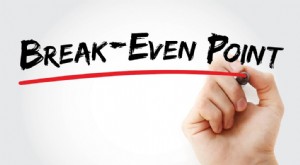Quand devriez-vous abandonner l'assurance automobile à couverture complète à la responsabilité civile?
Assurance automobile - nous savons tous que nous en avons besoin. En réalité, c'est exigé par la loi, mais déterminer combien acheter est une décision plus trouble.
L'assurance automobile offre la protection dont vous (et les conducteurs que vous rencontrez) avez besoin pour rouler en toute sécurité, mais à quel prix ?
Alors que vous voulez vous assurer que vous êtes amplement protégé, personne ne veut payer trop cher pour une couverture dont il n'a pas besoin. Le but est de trouver le bon endroit où vous payez le minimum pour une protection maximale.
En plus de magasiner pour des taux d'assurance automobile inférieurs, vous pouvez économiser sur l'assurance automobile en modifiant les montants de votre franchise et de vos couvertures, ou en abandonnant la couverture complète au lieu de la couverture responsabilité civile uniquement.
Laissez cet article être votre guide lorsque vous faites le choix entre une couverture complète et une responsabilité civile uniquement, et obtenez la couverture dont vous avez besoin.
Sélectionnez votre état pour commencer
Table des matières
Defining Full Coverage and Liability Only
The first key to picking the best coverage for your needs is knowing what each type of policy encompasses.
From there, you can do the math and assess your needs to see which is the best fit for you and your vehicle. Tout d'abord, let’s define liability and full coverage auto insurance.
What Is Full Coverage Car Insurance?
Full coverage auto insurance protects you if your vehicle is damaged or totaled, covering both collision and comprehensive coverage.
Here are a few specifics covered by most comprehensive plans:
- Animal-induced damage
- Falling objects
- Feu
- Vol
- Vandalisme
- Weather damage
And many full coverage plans roll in medical bills and life insurance. Research each policy’s benefits to choose the best option.
What Is Liability Auto Insurance?
Liability insurance is far more limited in scope. Essentiellement, it covers damage to other people or property when you cause it.
En d'autres termes, your coverage pays for their damages but not yours, meaning you will be responsible for paying for your own vehicle’s damage.
Liability coverage boils down to two categories:
- Bodily injury :If someone is injured in an accident you cause, your policy kicks in to help cover their medical expenses.
- Property damage :When a person’s property, usually their car, is damaged at your hands, your coverage takes care of repairing or replacing it.
What Coverage Are You Required to Have?
In most states, liability insurance is the basic level of insurance legally required for drivers. But in some instances, you might be required to purchase full coverage insurance.
Lorsque? If there is an outstanding loan on your vehicle, your lender will probably require you to maintain full coverage to protect their interests.
Après tout, what incentive is there to pay off a totaled vehicle? But you can usually drop full coverage insurance if you have a clear title on the vehicle.
How to Decide If You Should Drop Full Coverage
If your vehicle is all paid up and 100% yours, you may be wondering whether or not you should keep your full coverage policy.
Just because you can drop full coverage doesn’t mean it is necessarily a good idea. The key is striking a balance between risk tolerance and affordability.
D'un côté, you could have more coverage than you realistically need, which means you’re wasting money. D'autre part, if you purchase insufficient insurance, you could be out of luck following an accident.
Here’s a scenario:Let’s say you buy a brand new $30, 000 car with cash. Could you afford to replace it on your own if you’re at fault in an accident and have only liability insurance? Peut-être.
But is it worth saving a couple hundred dollars a year on insurance to take the risk? Probablement pas.
At its core, auto insurance is the transfer of risk. These are just a few of the questions you need to ask as you make the decision.
Do the Math
When it comes to determining your level of auto insurance, it’s all about the numbers. In order to decide between full coverage and liability insurance, you need to assess the following factors:
- Âge :While age shouldn’t be the sole determinate, especially if your car is in pristine condition or the mileage is low, it’s definitely a factor worth considering. If your car is nearing its 10th birthday, it has likely depreciated and may not be worth the cost of full coverage. Your antique roadster is an obvious exception.
- Kilométrage :Along those lines, your vehicle’s mileage plays into its value. If your adventurous treks, carpools, and commuting have left you with over 100, 000 miles of memories, your car’s value has dropped in response.
- Porter :All those years of memories usually come with some wear and tear. If your car’s decline is really notable, that will factor into its overall worth, trop.
- Loan :Do you own your vehicle? If you’ve paid off your auto loan, you may want to consider downgrading your coverage, in accordance with the other factors on this list.
- Valeur :Overall, you need to take a look at the factors above to determine the value of your car. Is it worth the cost of coverage to repair or replace it in the event of an accident? The less expensive your vehicle, the less your need for full coverage is.
- Replacement Cost :Now take those numbers and compare them to your deductible costs. If you wrecked with liability coverage only tomorrow, could you pull the replacement value out of your pocket?
- Policy Cost :How much are the premiums and the deductible on your policy? If they exceed your means, you could consider switching policies. Ou, if you’re well within your means and the coverage is stellar, you may want to hold onto that full coverage policy.
- Couverture :Here is the ultimate question when it comes to deciding on auto insurance. Which policy will provide the best coverage for your needs?
- Emergency fund :How does your emergency fund look? If it’s non-existent or looking thin, you should probably keep your full coverage policy while working to build it up.
Pro Tip:Use the 10% rule of thumb
If the annual cost of your full coverage insurance is more than 10% of the replacement value you would receive from your insurance company, then it may be a good idea to drop full coverage.
Par example, let’s say your car is worth $4, 000, and you have a $1000 deductible. After paying your deductible, the most you would get from your insurance company would be $3, 000 .
If your insurance premiums for full coverage are more than $300 a year, then it may be a good idea to drop the full coverage and go with liability only.
You can save a fair amount of money on your premiums each month to put toward an emergency fund to cover any damages or repairs which you may need for your vehicle, or toward a new car fund.
Do Your Research
When deciding between full coverage and liability only insurance, you need to read the details of your policy carefully. While your unique situation will require you to research more factors, there are three key considerations within a liability policy.
Insurers set limits on how much your policy covers, and once you max out that amount, you’re responsible for paying the rest of the damages.
Policy caps are broken down into the following three categories:
- Bodily injuries per accident :Bodily injury coverage varies from policy to policy, but it usually caps off around $500, 000.
- Bodily injuries per person :The per-person amount of bodily injury coverage maxes out around $250, 000.
- Property damage per person :You can typically get up to $100, 000 towards property damage repair with a liability plan.
Don’t Drop Full Coverage Just Because You Can
Some people will drop full coverage to limited coverage as soon as they pay off the vehicle.
Typiquement, they will base this decision on their driving track record and assume nothing major will happen that they can’t compensate for out of their own pockets.
Accidents are by definition, unpredictable. Anything can happen to anyone at any time. My advice is to get the best coverage you can afford at the fairest rates.
Get Quotes on Auto Insurance
Don’t make your decision in the dark! Running the numbers on your vehicle’s age, mileage, and overall value are just the first steps. Within minutes, you can get free quotes on the best auto insurance rates available to you, whatever type of policy you choose.
Résultat final
If you’re on the fence about dropping full coverage because of cost, make sure to check out all your options.
Every company uses different criteria to determine rates, and you may be able to find full coverage at a less expensive rate from another carrier.
You should also review your current policy and drop unnecessary options.
Saving money and keeping your coverage could be as simple as increasing your deductibles.
Here are some of the best auto insurance providers in your area:
Assurance
- Ce que vous devez savoir sur la souscription d'un conducteur adolescent à votre assurance automobile
- Comprendre le programme national d'assurance maladie pour enfants (SCHIP)
- BlueCross BlueShield rembourse 22,6 millions de dollars aux clients du Tennessee
- Formulaire de couverture des risques des constructeurs
- Ce que l'assurance des biens personnels ne couvre pas
- Assurance responsabilité du fait des produits :qui en a besoin ?
-
 Les 3 rapports financiers les plus importants pour les petites entreprises
Les 3 rapports financiers les plus importants pour les petites entreprises Après une récente fin de trimestre, Oracle a annoncé que ses revenus trimestriels totaux étaient en hausse de 11% en glissement annuel, dont les ventes à linternational représentent 60% de son chiffre...
-
 MoviePass est condamné,
MoviePass est condamné, Mais il veut toujours votre argent Crédit dimage:@sabrinafvholder/Twenty20 Limplosion de MoviePass, la startup qui aurait pu être la Netflix des premières sorties en salles, na été rien de moins q...
-
 Mise à jour de stimulation :vous pourriez avoir 2 autres chèques à venir cette année. Voici quand ils arriveront
Mise à jour de stimulation :vous pourriez avoir 2 autres chèques à venir cette année. Voici quand ils arriveront Beaucoup ou tous les produits ici proviennent de nos partenaires qui nous paient une commission. Cest comme ça quon gagne de largent. Mais notre intégrité éditoriale garantit que les opinions de nos e...
-
 Non,
Non, Les masques dHalloween ne tiennent pas à lécart du COVID Au cours de lété, le slogan le plus approprié pour ces temps étranges est venu de certains dirigeants de parcs dattractions au Japon. Dans ...




